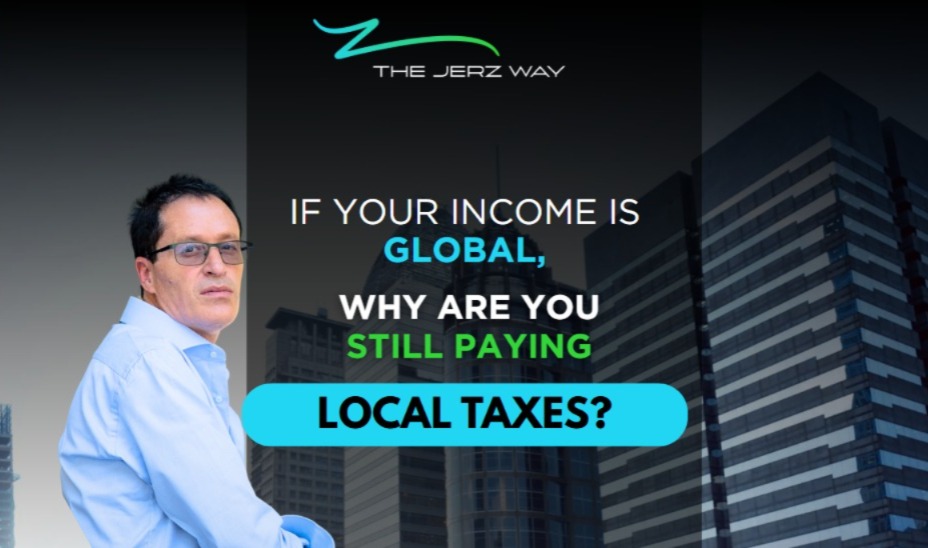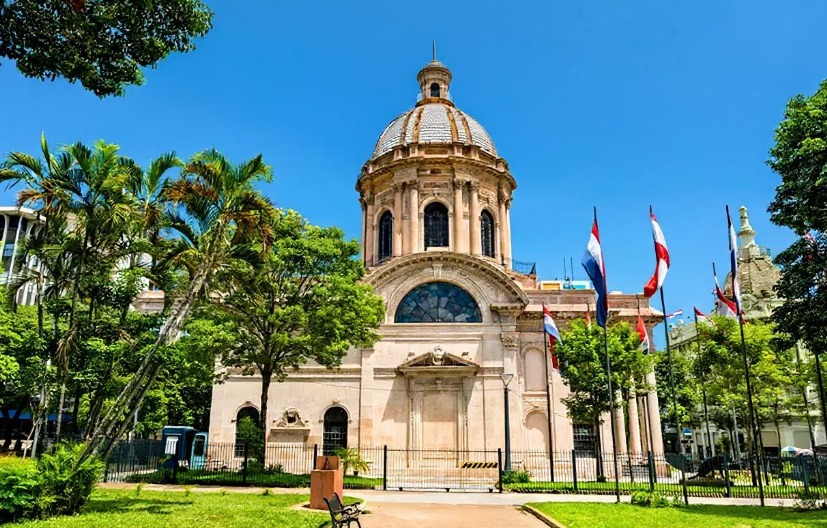June 4, 2025
Tax FreeLivingThe “Paraguay Loophole” for Global Nomads Who Don’t Want to Pay Taxes

This blog post reveals a strategic method to legally escape global taxation using Paraguay's territorial tax system. It breaks down how digital nomads and remote entrepreneurs can become permanent residents in Paraguay, obtain tax residency, and sever ties with their high-tax countries. Readers learn exactly how to establish Paraguay as their legal tax home while maintaining full international mobility. It also highlights risks, legal compliance, and real success stories from clients who’ve saved tens of thousands in taxes annually.
Stop Paying Taxes Like You Still Live in 1995
If you're a global nomad earning money online and still giving 30–50% of it to a country you don’t even live in… it's time to wake up.
There’s a legal, permanent, and underutilized solution that lets you opt out—without giving up your citizenship, without breaking the law, and without living in one place full-time.
It’s called the Paraguay Residency Loophole, and it’s one of the smartest moves you can make in 2025.
In this guide, I’ll break down:
- How the Paraguay system works
- Why it’s legal (and smart)
- Who it’s for
- How to set it up step-by-step
- And how to protect yourself against mistakes, audits, or red flags
Let’s dive in.
Why Paraguay? The World's Quietest Tax Hack
Paraguay has one of the most flexible, low-overhead tax systems in the world. It’s a territorial tax country, which means you only pay taxes on income earned inside Paraguay. Not abroad. Not on investments. Not on your online business. Not on crypto.
That means if your income is earned outside of Paraguay—from crypto, online business, remote work, or investments— you don’t pay local tax.
Not now. Not ever.
And here’s the best part: they don’t require you to live there full-time to keep your residency active.
Understanding Territorial Taxation
Here’s how territorial tax works:
- Paraguay only taxes income earned inside its borders.
- They don’t care what you earn on Binance, Upwork, your LLC, or your global stock portfolio.
This is the exact opposite of the U.S., Canada, or most of Europe—where they tax your worldwide income just for holding a passport.
Under the Paraguay model, if you:
- Work online
- Get paid through a foreign company or LLC
- Invest in crypto, stocks, or real estate
- Earn passive income from another country
...then none of that is subject to Paraguay income tax. Period.

Who This Works For
The Paraguay residency strategy is ideal for:
- Digital nomads
- Remote freelancers or consultants
- Crypto traders
- International business owners
- Long-term travelers
- People exiting high-tax countries
You don’t need to be a millionaire or give up your passport. You just need to be intentional and structured.
What Makes It a “Loophole”?
This isn't a loophole in the sketchy sense.
It’s a perfectly legal gap most governments ignore because Paraguay:
- Doesn’t chase global income
- Doesn’t enforce strict physical presence rules
- Doesn’t require you to become a citizen
So if you become a tax resident of Paraguay, and and leave your old tax system behind—you can legally pay $0 on global income.
Step 1: Get Permanent Residency
Paraguay offers straight-to-permanent residency, often within 90–120 days. It doesn’t require you to live in the country full-time.
You’ll need:
- A passport
- Criminal background check (apostilled)
- Proof of economic solvency (bank statement or deposit of ~$5,000)
- Birth certificate (apostilled)
Once approved, you’re a permanent resident for life.

Step 2: Establish Tax Residency
Tax residency is separate from immigration residency. To establish it, you need to:
- Spend 90+ days in Paraguay in a calendar year, or
- Obtain a Certificate of Tax Residency from Paraguay’s tax authority (SET)
Once you have that certificate, Paraguay becomes your official tax home.
Step 3: Exit Your Previous Tax Residency
This is the part most people screw up.
To be taxed only in Paraguay, you must legally break ties with your old tax country. That means:
- Giving up fiscal residency status
- Cutting center of vital interests (home, family, etc.)
- Closing tax files if required (like the Canadian NR73)
Otherwise, you could be double taxed, even if you live abroad.
Step 4: Don’t Trigger Red Flags
To stay invisible to tax agencies:
- Don’t have utility bills, leases, or family in high-tax countries
- Avoid receiving payments in your name in those countries
- Don’t spend 183+ days in any one place
- Use a local accountant to document your Paraguay setup
Opening a Bank Account in Paraguay
Once you’re a resident, you can open a Paraguayan bank account. This makes it easier to:
- Prove economic ties
- Get your tax residency certificate
- Receive local income (if needed)
You’ll need your residency card and cedula to open most accounts.
Why is Paraguay the top choice for nomads and entrepreneurs seeking low taxes and total freedom?
Watch “The Sovereign’s Shortcut” and see what Dubai doesn’t want you to know.
Does It Work for Americans?
Yes… but with a catch.
The U.S. taxes citizens on worldwide income. But here’s how Paraguay still helps:
However, Paraguay still works as a tax base if you:
✅ Use the Foreign Earned Income Exclusion (FEIE)
✅ Separate business income via offshore structures
✅ Defer taxes legally with entity structuring
If you want full tax freedom, you’ll have to renounce. But for most, Paraguay still saves thousands per year.
Combining With an Offshore Structure
Want maximum efficiency? Pair Paraguay tax residency with:
- A foreign LLC (like U.S. LLC for non-U.S. persons)
- An offshore bank account
- A second passport or citizenship-by-descent program
This gives you separation of legal identity, income flow, and tax home.
You Don’t Have to Live There
Paraguay doesn’t require 183-day stays or mandatory re-entry.
Once you have your residency and tax certificate, you can live in:
- Argentina
- Brazil
- Spain
- Dubai
- Thailand
…anywhere, and still keep your Paraguayan tax status—as long as you’re not tax resident elsewhere.

Paraguay Is Not on the OECD Radar
Unlike Panama, Belize, or the Caribbean islands, Paraguay isn’t considered a “tax haven” by OECD or the EU.
That means:
- Less scrutiny
- Easier compliance
- Fewer questions from banks or governments
It’s the quietest legal tax base you can get right now.
How Much Does It Cost?
Residency setup with a qualified service provider ranges from $3,000–$5,000, depending on how much is handled for you.
That includes:
- Application support
- Apostilles and translations
- Legal filings and immigration office fees
Add ~$500/year if you want ongoing compliance and tax certificates.
Timeframe to Set It Up
The full process—residency + tax certificate + bank account—can be completed in 90 to 180 days.
Many nomads spend 2–3 months in Paraguay to get everything locked in before continuing their travels.

Risks to Watch Out For
This isn’t a “set it and forget it” solution. Here are the key risks:
- Not exiting your old tax residency properly
- Being flagged for economic substance issues
- Spending too much time in one foreign country
- Triggering Controlled Foreign Corporation (CFC) laws
Have a strategy and get professional help.
Real Stories, Real Wins
We’ve helped clients:
- Save $40K+ per year in taxes
- Shield crypto gains from EU reporting
- Build asset structures with Paraguay at the center
- Gain banking access denied elsewhere
This isn’t theory. This is working right now.
Freedom requires structure
If you want to legally cut your tax rate to near-zero, protect your wealth, and keep global mobility wide open—Paraguay is your launchpad.
👉 Book a strategy consult now and let’s build your tax-free life the smart way.
.jpeg)
Want to learn more? Check out these related resources:
Curious how Paraguay actually works in practice? How I Used Paraguay as a Legal Tax Base While Traveling the World walks through the exact steps one nomad took to disconnect from the German tax system without skipping a beat.
Connect With Us
02
Action Plan & Document Collection
We create a tailored action plan aligned with your chosen service(s). This stage includes gathering required documents and handling essential tasks such as translations, apostilles, and genealogical research.
